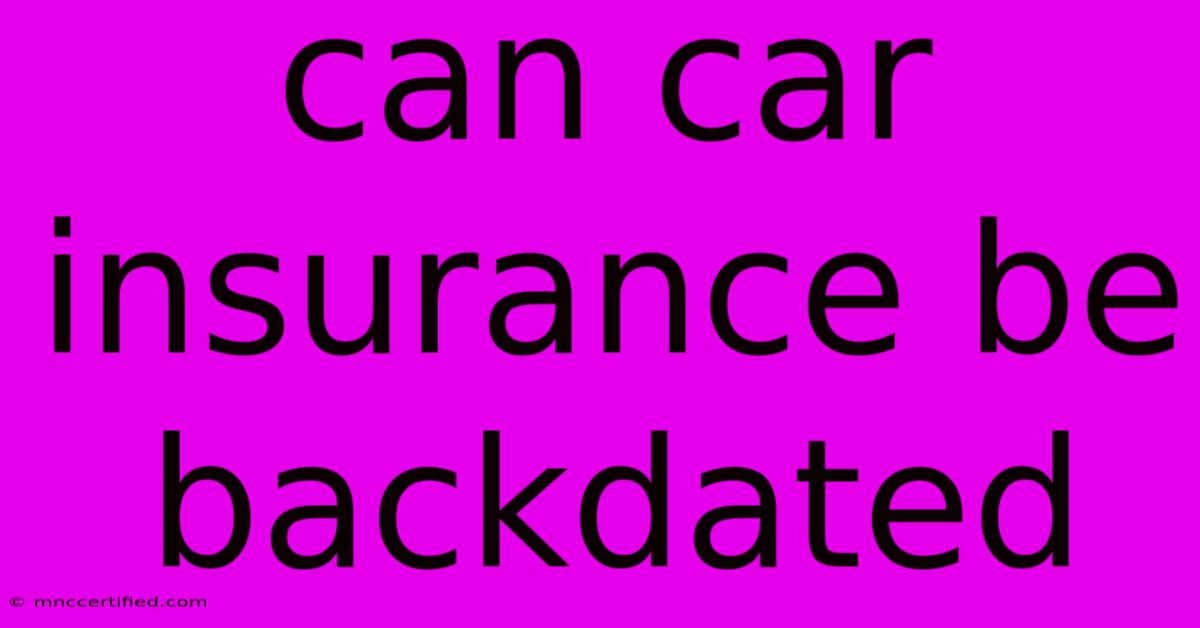Can Car Insurance Be Backdated

Table of Contents
Can Car Insurance Be Backdated? A Comprehensive Guide
Thinking about getting car insurance but realized you should have gotten it sooner? Many people wonder if it's possible to backdate their car insurance policy. The short answer is: sometimes, but it's not always straightforward. This guide will explore the complexities of backdating car insurance, highlighting the circumstances where it might be possible, the potential challenges, and what you should do instead.
Understanding the Limitations of Backdating Car Insurance
Backdating car insurance means obtaining a policy with a start date earlier than the date you apply. Insurance companies are generally reluctant to backdate policies because it introduces significant risk. They need to assess the risk accurately, and a backdated policy makes this difficult. They can't access information about your driving history prior to the application date, increasing the chances of unforeseen claims.
Why Insurers Are Hesitant
- Risk Assessment: Insurers rely on your driving history to assess your risk. Backdating makes it impossible to verify your driving record during the backdated period.
- Fraud Prevention: Backdating could potentially be used to fraudulently cover accidents or incidents that occurred before the policy's official start date.
- Administrative Complexity: Processing a backdated policy requires additional administrative work and careful scrutiny.
When Backdating Might Be Possible (Rare Circumstances)
While generally difficult, there are extremely limited situations where an insurer might consider backdating:
- Oversight or Delay: If you applied for insurance promptly but there was an unforeseen delay in the processing on the insurer's end, they might be willing to adjust the start date to reflect the original application date. This requires providing strong evidence of the timely application.
- Short Gaps in Coverage: Some insurers may be more lenient with very short gaps in coverage, perhaps a few days. However, this is unlikely for longer periods.
- Specific Circumstances (Rare Exceptions): Exceptional circumstances, such as a significant life event causing a delay in obtaining insurance, could potentially influence an insurer's decision. However, expect stringent evidence requirements.
Important Note: Even in these rare cases, it's not guaranteed. The insurer always reserves the right to refuse a backdated policy.
What to Do Instead of Trying to Backdate
Rather than focusing on backdating, which is often unsuccessful, consider these alternatives:
- Immediate Application: The most effective way to avoid gaps in coverage is to apply for car insurance as soon as you need it.
- Temporary Insurance: Short-term or temporary car insurance policies can bridge short gaps in coverage while you wait for a longer-term policy to be approved. These policies are readily available and offer immediate cover.
- Honest Disclosure: If you've had a gap in coverage, be completely transparent with your insurer when applying for a new policy. Don't try to hide it; honesty is crucial.
The Consequences of Driving Without Insurance
Driving without insurance is illegal and carries serious consequences, including:
- Heavy Fines: Significant financial penalties can be imposed.
- Points on Your License: This can lead to license suspension or revocation.
- Increased Insurance Premiums: Future insurance premiums will likely be much higher due to the lack of prior coverage.
- Potential Court Appearances: Depending on the severity of the offense, court appearances might be necessary.
Conclusion: Prioritize Timely Insurance Coverage
While the possibility of backdating car insurance exists, it's extremely rare and not something you should rely on. The best approach is to obtain car insurance promptly and maintain continuous coverage to avoid legal and financial penalties. Focus on proactive insurance planning rather than attempting to rectify a lapse in coverage afterward. If you have any doubts or questions, always contact your insurance provider directly. They're the best source of information regarding your specific circumstances.

Thank you for visiting our website wich cover about Can Car Insurance Be Backdated. We hope the information provided has been useful to you. Feel free to contact us if you have any questions or need further assistance. See you next time and dont miss to bookmark.
Featured Posts
-
Cyberattack Supermarket Food Shortages Emerge
Nov 27, 2024
-
City Blows Lead Feyenoords Epic Win
Nov 27, 2024
-
Commitment For Title Insurance
Nov 27, 2024
-
Prince Insurance Gloucester Ma
Nov 27, 2024
-
Pub Petition Calls For Another General
Nov 27, 2024